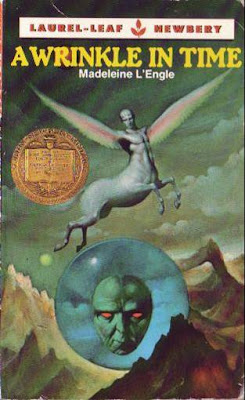Square the Squared Square
 Emily has already posted a lovely tribute to the late Madeleine L'Engle over on her blog, and said a fair amount of what I would have said. Instead, I will say this:
Emily has already posted a lovely tribute to the late Madeleine L'Engle over on her blog, and said a fair amount of what I would have said. Instead, I will say this:
Writing science fiction is always difficult. Writing science fiction for a juvenile audience, perhaps even moreso. Nobody can really set out to create something that will become "a classic" or something beloved of even a single generation of readers, let alone many. But L'Engle accomplished that where many of her contemporaries did not.
Consider, for example, Robert Heinlein. A large portion of his prolific output was what fans call "juvies." Stuff like Red Planet, Starman Jones, and Have Spacesuit, Will Travel was meant by Heinlein specifically for young audiences. Good stuff, no doubt, but Heinlein was clearly dumbing it down a bit. And it's all pretty dated, all rocketships, ray-guns and Martians.
A Wrinkle in Time, by contrast, continues to feel fresh and modern, in spite of having been published in 1962. It has a timeless quality that a vast amount of science fiction, especially science fiction of that era, lacks. Because there is nothing specifically grounding it in the early '60s, it is as easy to imagine it taking place in the '80s or in 2007.
And while it doesn't go into enormous detail about relativistic physics or space-time mechanics, the necessary concepts are explained clearly enough that a relatively intelligent 8-year-old can grasp what's going on fairly well. Let me put it this way: last fall, I took an astronomy class. At the point in the curriculum when it came time to explain some of the more esoteric concepts, the professor brought in a guest lecturer, her husband, who was a physics professor. He began explaining the idea of a fourth dimension, I realized it was something I'd heard before. He was not using the exact words, but his explanation was certainly couched in the same terminology as Mrs. Who and Mrs. Whatsit's description of the concepts to Meg and Calvin. I was stunned when, a few minutes later, he actually used the word "tesseract." I had always assumed it was a word L'Engle had invented.
As it turns out, it's a word she had merely appropriated. It's more of a geometric concept, really, than Wrinkle's teleportation/space-folding/wormhole-ish method of travel through space and time. Still, it was a not entirely incorrect word for the situation.
That's just amazing. Intelligent, timeless and entertaining, all in one package? A combination of high adventure and real science that creates a book that both space opera and hard sci-fi lovers can agree upon as a classic? What's not to love?
A Wrinkle in Time is one of a handful of childhood literary loves that Emily and I share. She's never quite gotten how it is that I reached adolescence without reading the Little House books, and I've never quite understood how it is that she got through adolescence without reading The Lord of the Rings...but A Wrinkle in Time occupies a similar space in both of our hearts and minds.
So long, Madeleine, and thanks for everything.


